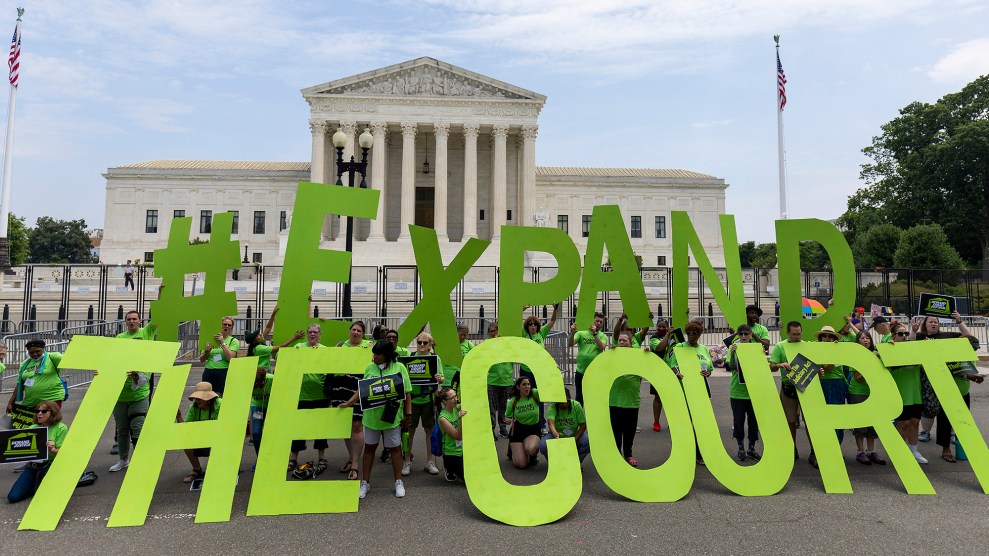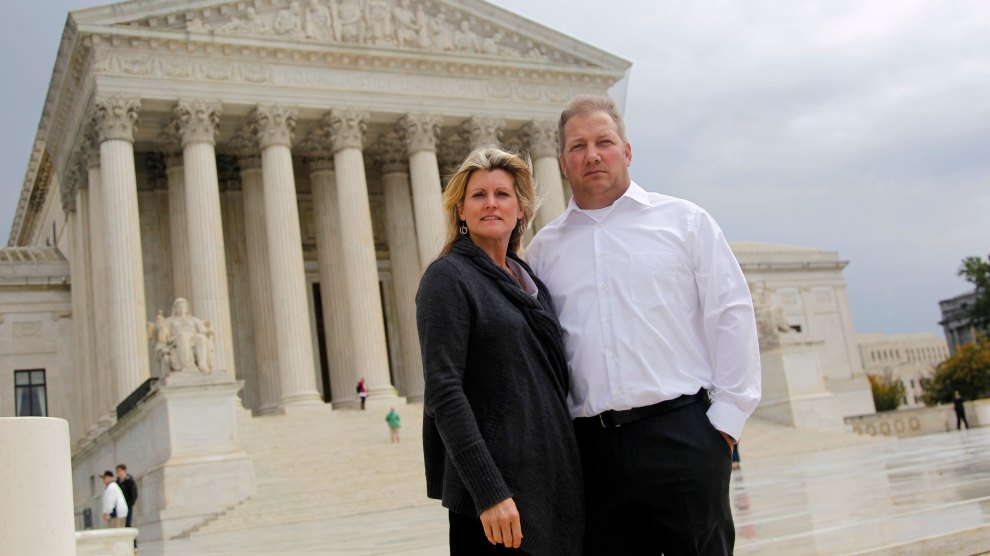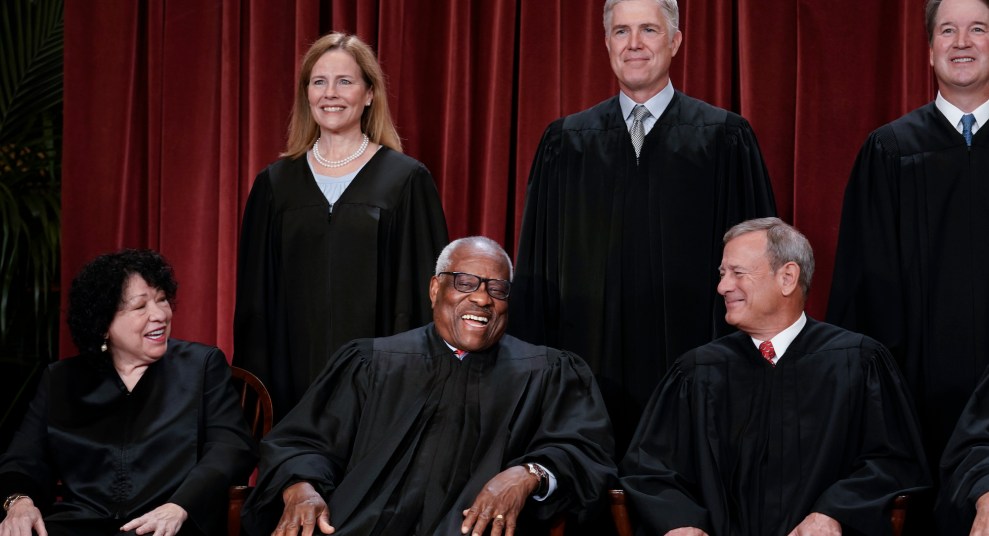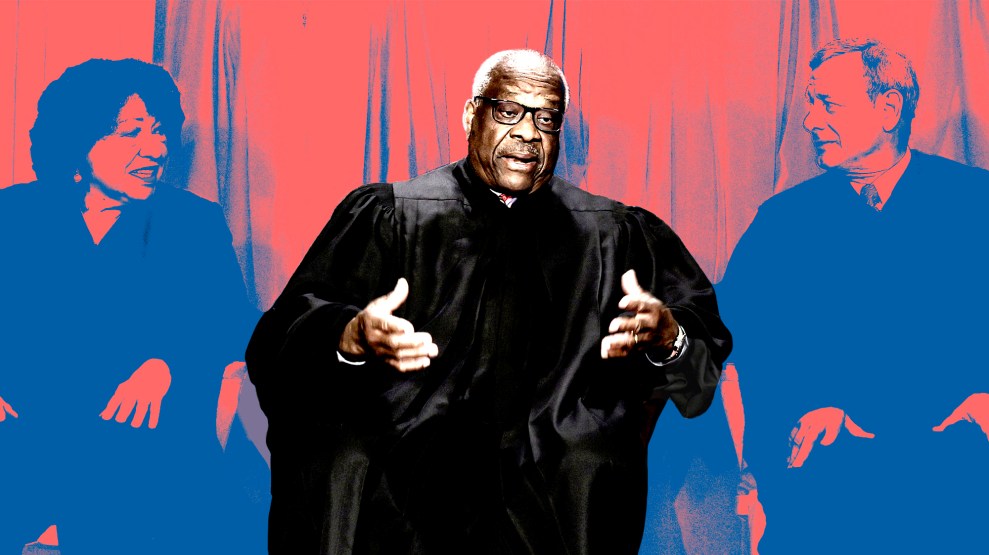
Activists for Expanding the Supreme Court Rally outside the Supreme Court on June 22, 2022 in Washington, DC. Tasos Katopodis/Getty
The movement to counter the Supreme Court’s rightward lurch has come a long way since 2018, when a small but dogged group of progressive advocates began pushing to expand the nine-member court. In Democratic circles, the idea has gained traction, particularly in the wake of the Supreme Court’s decision overturning the right to abortion, and recently it has attracted two big name allies.
Last week, Democratic lawmakers gathered on the steps of Supreme Court to reintroduce the Judiciary Act, a bill to add four justices to the nation’s highest court, with the nation’s two largest abortion rights groups, Planned Parenthood and NARAL-Pro-Choice America, joining them. Abortion rights have been the most high profile victim of the Trump-tilted court’s right-wing activism. In 2021, the court allowed a Texas law known as SB8 to take effect, barring abortion at six weeks of pregnancy in defiance of Roe v. Wade. Then in June 2022, the court overturned Roe in Dobbs v. Jackson Women’s Health Organization. Currently, a challenge to the availability of mifepristone, a drug used in medication abortions, is winding its way to the Supreme Court and could drastically reduce the availability of abortion nationwide.
“Our courts are supposed to be protecting and advancing our rights, and instead, they’re attacking our rights,” says Angela Vasquez-Giroux, vice president of communications and research at NARAL, explaining the group’s endorsement of court expansion. With SB8, Dobbs, and now the mifepristone case, “those three things happening in such quick succession really made the case for how corrupt and how broken the judiciary is.”
The support of Planned Parenthood in particular could signal an important pivot point for the movement. “They occupy such an outsize role in the reproductive rights space and in the Democratic electoral space,” says Brian Fallon, co-founder and executive director of Demand Justice, a court reform group that has pushed Supreme Court expansion for several years. Their endorsement “makes it much more likely that it’s going to be a consensus position in the Democratic Party within a short period of time.”
Dobbs has created “a public health crisis, but we’re also really at a critical crisis for the democracy,” says Jacqueline Ayers, senior vice president of policy, organizing, and campaigns at Planned Parenthood. “This is a time for structural reform.”
The Judiciary Act has gained a few new cosponsors since it was first introduced two years ago. One notable addition was Maryland’s Rep. Jamie Raskin, whose national profile grew while leading Donald Trump’s second impeachment trial. Rep. Adam Schiff, who played the same role in Trump’s first impeachment, signed onto the legislation last year. This year, as he runs for Senate in California, he joined as a leading co-sponsor. Rep. Katie Porter, who is also running for Senate in California, recently signed on as well. “It shows that if you’re a Democratic candidate, you’re increasingly likely to join this cause and support this legislation,” says Fallon, noting that Raskin is mulling a Senate bid.
President Donald Trump added three justices to the Supreme Court, including one to the seat that then-Senate Majority Leader Mitch McConnell held open for over a year to deprive President Barack Obama of an appointment. With a six-three conservative majority, the court lurched further to the right. In addition to ending the right to abortion, last June the justices made it much harder for states to restrict firearms, limited environmental regulation, and opened the door to prayer in public schools. This month, the court further limited environmental regulations under the Clean Water Act. In June, it is expected to end affirmative action in higher education, allow businesses to discriminate against LGBTQ customers, and eviscerate what is left of the Voting Rights Act. For many progressives, this avalanche of right-wing rulings is an existential threat to their work and to the idea of a multiracial democracy with equal rights for all. Adding justices to the court is the most expedient solution—though getting the bill through Congress remains a long shot.
Ever since President Franklin Roosevelt attempted to add justices in the 1930s and suffered political backlash, the idea of packing the court has been seen as taboo. But some lawmakers are now coming around to the idea, with the Judiciary Act counting 61 cosponsors in the House. The most powerful and entrenched Democrats, including President Joe Biden and the leaders of the Senate’s judiciary committee, remain unconvinced, however. The bill is far more popular in the House than the Senate—the body which actually confirms federal judges. It has three cosponsors in the upper chamber: Democrats Edward Markey and Elizabeth Warren of Massachusetts and Tina Smith of Minnesota. Though it has a long way to go before having a chance at success, the idea of court reform, including expansion, has already come further than many thought possible.
Fallon believes that the court’s recent ethics scandals, largely revolving around Justice Clarence Thomas’ relationship with GOP megadonor Harlan Crow, are emboldening Democrats and the party’s allies to take aim at the court. Court expansion is one approach, while a more mainstream proposal entails instituting a code of ethics for Supreme Court justices. “There’s absolutely no boundaries between these people who are put on the court for a specific reason and the folks who were bankrolling them or who have business before them,” says Vasquez-Giroux. One revelation about Thomas came in the form of a portrait of him smoking cigars with Crow and Leonard Leo, a fixture at the conservative Federalist Society who has played a considerable role in shaping the makeup of the court. Leo, another report revealed, secretly funneled tens of thousands of dollars to Ginni Thomas, the justice’s wife.
The growing number of scandals around Thomas and some of the other conservative justices “created a sense that the court is beleaguered and that focusing attention on the court is a political winner,” says Fallon. The scandals have “caused a lot of people that were otherwise loath to go there in terms of criticizing the justices to now take the gloves off.”













